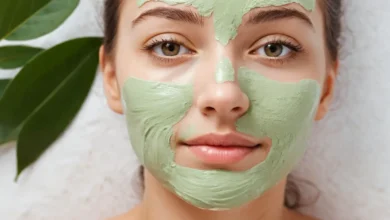The Ultimate Guide to Achieving Clear Skin Naturally

Clear skin is a universal desire, but the journey to achieving it can sometimes feel overwhelming. With an abundance of skincare products and treatments, it’s easy to forget that natural remedies can also work wonders for your skin. For those looking to achieve a flawless complexion without harsh chemicals, this guide offers simple, effective tips and strategies that can help you attain clear, radiant skin naturally. Let’s explore the best practices to improve your skin health without sacrificing its natural balance.
Introduction
Your skin is a reflection of your overall health. Factors like diet, hydration, and sleep play just as important a role in achieving clear skin as the skincare products you use. Many people assume that achieving flawless skin requires expensive treatments or complicated routines. However, natural remedies and lifestyle changes can provide powerful results that are sustainable and safe in the long run. From reducing acne to evening out your skin tone, natural solutions can make a significant difference in your skin’s appearance. Ready to glow? Let’s dive into the ultimate guide for clear skin, naturally.
1. Hydrate, Hydrate, Hydrate
The first and most essential step to clear skin is staying hydrated. Drinking enough water flushes out toxins and keeps your skin hydrated from the inside out. Dehydration can make your skin look dull and emphasize imperfections like fine lines and blemishes. Aim for at least 8 glasses of water daily.
Pro Tip: Infuse your water with lemon or cucumber for added antioxidants and a refreshing taste.
FAQ: How does hydration affect skin clarity?
Proper hydration helps maintain your skin’s elasticity and reduces the likelihood of developing fine lines. It also aids in flushing out toxins that can lead to breakouts and other skin issues.
2. Use Honey as a Natural Cleanser
Honey has antibacterial and anti-inflammatory properties that make it an excellent natural cleanser. It helps unclog pores, remove excess oil, and treat acne without stripping your skin of its natural moisture.
Pro Tip: Apply raw honey directly to your skin as a face mask for 10-15 minutes, then rinse with warm water. This will leave your skin feeling soft, clean, and refreshed.
FAQ: Can honey help reduce acne?
Yes, the antibacterial properties of honey make it effective in reducing acne-causing bacteria while also soothing inflamed skin.
3. Incorporate Apple Cider Vinegar into Your Routine
Apple cider vinegar (ACV) acts as a natural toner by balancing the skin’s pH levels. Its antibacterial and antifungal properties help clear acne and prevent future breakouts. Dilute one part ACV with two parts water and apply it to your face using a cotton pad.
Pro Tip: Use ACV as a toner after cleansing, but ensure it’s properly diluted to avoid irritation, especially if you have sensitive skin.
FAQ: Can apple cider vinegar help with dark spots?
Yes, regular use of diluted ACV can help fade dark spots and even out your skin tone.
4. Exfoliate Regularly with Natural Ingredients
Exfoliation is key to removing dead skin cells and promoting cell turnover, which leads to brighter and clearer skin. Instead of using harsh chemical exfoliants, opt for natural ingredients like sugar, oatmeal, or ground coffee to gently scrub away impurities.
Pro Tip: Mix sugar with a bit of coconut oil or honey for a DIY exfoliant that’s gentle yet effective.
FAQ: How often should I exfoliate naturally?
Exfoliating 2-3 times a week with natural ingredients is typically enough to keep your skin clear and smooth without causing irritation.
5. Get Plenty of Sleep
Sleep is one of the most underrated beauty secrets. When you sleep, your body repairs itself, including your skin. A lack of sleep can lead to dark circles, puffiness, and breakouts. Aim for 7-9 hours of sleep every night to give your skin the time it needs to rejuvenate.
Pro Tip: Elevate your head slightly while you sleep to reduce puffiness and dark circles in the morning.
FAQ: Can poor sleep really cause breakouts?
Yes, sleep deprivation can increase cortisol levels, which leads to inflammation and can trigger acne.
6. Eat a Skin-Boosting Diet
What you eat has a direct impact on your skin. A diet rich in antioxidants, vitamins, and minerals will help improve skin clarity. Foods high in vitamin C, like oranges and berries, boost collagen production, while foods rich in omega-3s, like salmon and walnuts, keep your skin hydrated and supple.
Pro Tip: Include leafy greens, nuts, and fruits like avocados in your daily diet to nourish your skin from the inside.
FAQ: Are there foods that can cause breakouts?
Yes, processed foods and those high in sugar and dairy can cause inflammation and lead to breakouts. It’s best to minimize these in your diet if you’re aiming for clear skin.
7. Use Aloe Vera for Soothing Relief
Aloe vera is a natural healer that can soothe irritated skin, reduce inflammation, and moisturize. It’s especially helpful for those with acne-prone skin. Aloe vera’s cooling properties make it an excellent natural remedy for sunburns, acne scars, and dry patches.
Pro Tip: Apply fresh aloe vera gel directly from the plant to your face daily to reduce redness and keep your skin clear.
FAQ: Can aloe vera help fade acne scars?
Yes, with consistent use, aloe vera can help lighten acne scars and promote skin regeneration.
8. Steam Your Face Weekly
Facial steaming is a natural way to deep clean your pores and promote circulation, leading to a clearer complexion. The steam opens up your pores, allowing impurities and toxins to be released. You can easily do this at home by boiling water, placing it in a bowl, and draping a towel over your head while you let the steam work its magic.
Pro Tip: Add essential oils like lavender or tea tree oil to the steaming water for added skin benefits.
FAQ: How long should I steam my face?
Steam your face for about 10 minutes once a week to prevent buildup of dirt and oils in your pores.
9. Keep Stress Levels in Check
Stress can wreak havoc on your skin, leading to breakouts, dullness, and even premature aging. Managing stress through techniques like meditation, yoga, or deep breathing exercises can help keep your skin clear and glowing.
Pro Tip: Incorporate stress-relief practices into your daily routine, even if it’s just for 10 minutes. This will do wonders for both your skin and mental well-being.
FAQ: How does stress affect skin health?
Stress increases the production of hormones like cortisol, which can trigger acne and worsen existing skin conditions.
10. Never Skip Sunscreen
Even if you’re staying indoors, sunscreen is non-negotiable for clear skin. Sun exposure without protection leads to hyperpigmentation, dark spots, and premature aging, all of which can affect skin clarity. Choose a sunscreen with at least SPF 30 that offers broad-spectrum protection against both UVA and UVB rays.
Pro Tip: Use a mineral-based sunscreen for a more natural option that’s gentle on sensitive skin.
FAQ: Do I need sunscreen on cloudy days?
Yes! UV rays can still penetrate clouds and damage your skin, so applying sunscreen daily is essential for maintaining clear skin.
Conclusion
Achieving clear skin naturally is not only possible, but it’s also more sustainable and gentle on your skin in the long run. By adopting these natural remedies and lifestyle habits, you can maintain a radiant complexion without the need for harsh chemicals or treatments. From staying hydrated and eating a nutrient-rich diet to using natural skincare ingredients like honey and aloe vera, these tips can help you achieve the clear, healthy skin you’ve always wanted. The journey to clear skin is a combination of mindful choices and consistent care — and the results are truly worth the effort.





